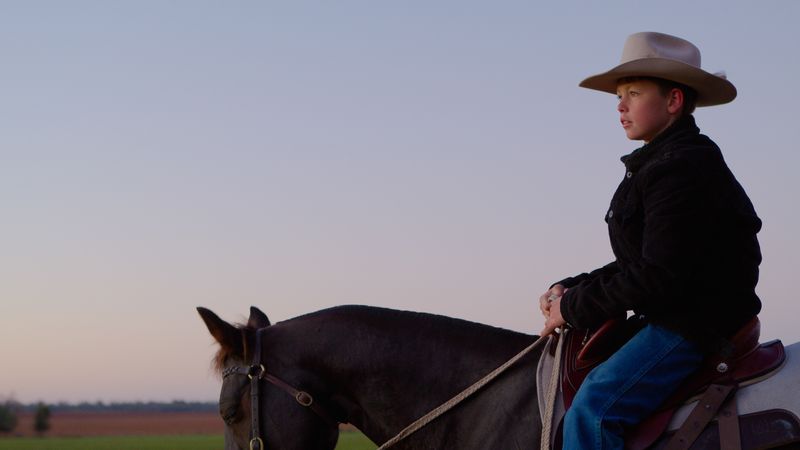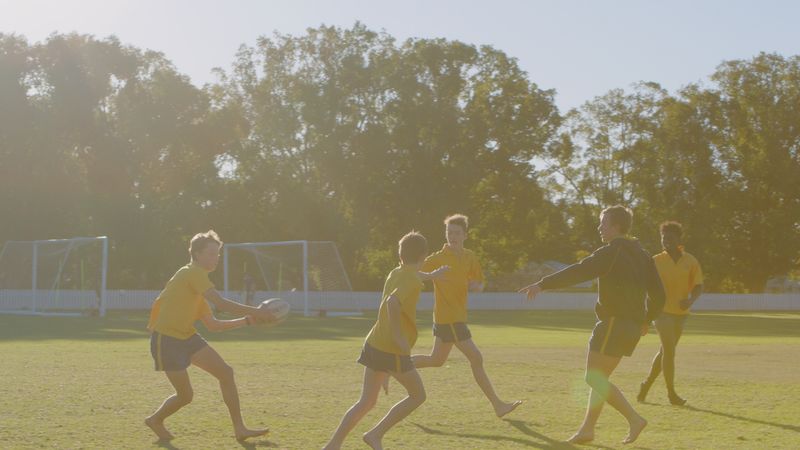“We acknowledge that you know your son, but we know boys and we know boarding. Let’s ensure that their care and wellbeing is a team effort.”— Mr Henry White, Head of House - Corfe

The transition into boarding can be a turbulent experience and it’s no secret that boarders who settle in quickly have often had ample opportunity to prepare.
In fact, I’ve coined the phrase “the clearer the runway, the smoother the landing” as a neat summary of this observation. A great deal of boarding experience can be initiated at home in the weeks and months leading up to your son’s departure, helping him prepare psychologically and logistically for his upcoming journey.
At TGS, we acknowledge that the boarding journey for boys and families starts long before they enter the house in late January. In the mind of a new boarder and their family, the transition into boarding school is a thought process that begins before enrolment and months, even years before they arrive. More often than not, it’s a process fraught with mixed anxieties and anticipation.
Our Corfe House staff have some key pieces of advice for new boarders and their families.
We want to get to know your son
Boarding is a fundamentally pastoral vocation; therefore, early and frequent communication between families and the boarding house is crucial for establishing firm bonds and understanding. Personally, I take any opportunity that allows me to connect with a prospective or incoming boarder. This can be through a phone call, email, or even a brief visit to the boarding house. However, what I most appreciate is a letter from your son introducing himself. Knowing his interests and hobbies enables me to cater to him more effectively within our program. Perhaps more importantly, understanding your son’s worries allows me to work with you and him to assuage any anxieties early on rather than letting them fester over the Christmas holidays.

Practice Makes Perfect
Corfe House runs on bells and whistles — routine is at the core of what we do. Once routines fall out of sync, we notice our boys tend to wobble. We follow the mantra “keep them busy and keep them informed” as we’ve noticed that moments of idle confusion, particularly upon arrival, often result in unfortunate periods of homesickness. Whilst routines are beneficial, they’re hard to master for a boy who’s never had one. As such, I recommend helping your son develop a routine and stick to it. A routine will ensure he prepares himself for the transition to boarding. It should include morning and evening bathing, bed-making, exercise, downtime and reading or study.
Moreover, in preparing psychologically for the boarding transition, any exposure to extended periods away from home in the lead-up is beneficial to boys prone to homesickness. If possible, organising a sleepover for your son or a few nights away from home with a friend or relative helps boys develop resilience.
Stay Busy
We acknowledge that any transition into a new home, routine and sudden immersion into a new community isn’t always a comfortable experience. This period of transition is an emotional one for all new boarders, each of whom approach this period in their own way, many of whom can become withdrawn and homesick. We encourage boys to stay busy – stay active – stay open-minded to new challenges and activities given to them – find joy in new tasks and with new people. By staying active, boys distract themselves from homesickness and through the process of time, we usually see these emotions subside as they familiarise themselves with their new environment and community.

Chunk It
We acknowledge that the emotional impact of transitioning into boarding is often exacerbated when boarders find themselves navigating new subjects, training schedules, friendship groups and the inevitable onset of fatigue. We encourage boys to pause, reflect and consider each task at hand – ask themselves: can it be broken or “chunked” into smaller, more manageable pieces? Often, we see that once boys have taken a moment to consider these things and focus on the single task at hand, the bigger picture doesn’t seem all that overwhelming anymore.
Transparency
We acknowledge that during a boy’s transition to boarding school, homesickness and anxieties are voiced over the phone to mums and dads, while a shield of stoicism and reticence is often held in the boarding house. This is a natural, yet unfortunate, part of the teething process that many of our boarders face in their transition. Firstly, please encourage your boys to speak with a trusted member of staff who can support them through the process. If we know about it – we can act on it. Secondly, don’t feel that you are betraying your son’s trust by keeping us informed of issues or concerns they relay to you. We are here to help. Open communication between the boarding house and families at home is fundamental to effective pastoral care and your son’s wellbeing.
Boarding is a Journey - Trust the Process
We acknowledge that in the life of a boarder, not every day is going to be a good one. Not every experience is going to be enjoyable. We encourage you to trust that our staff and systems are in place to support and facilitate growth and wellbeing. Boarding is a journey that is going to be rockier for some boys than others. It’s our role to guide them on course, but we need your trust and support in doing so.
For other useful articles about transitioning to boarding and the Senior School, visit the TGS Blog.
Latest Blog
Introducing Gabe Robbie, the new Head of Curriculum
I am excited to be joining the staff here at Toowoomba Grammar School in the role of Head of Curriculum. I grew up in a small coastal town in NSW and attended the University of Sydney to complete my undergraduate degree. Please don’t hold my NSW origin against me (Go Blues!). Teaching, and education, has always been a passion of mine and ever since I was in high school, the plan was to be a teacher. I graduated from the University of Sydney with a double degree in Education and Arts, majoring…
What Old Boys Have Contributed to TGS Over Time
The Old Boys’ Association has played an integral role in the history and tradition of Toowoomba Grammar School. It was formed on December 29, 1888, when 25 Toowoomba Grammar School Old Boys met at Long’s Imperial Hotel to create a new society. The Toowoomba Grammar School Old Boys’ Association rules were drawn up, and office-bearers elected. The inaugural president was Mr Joesph Vincent Herbert Esq. (TGS 1877-80) From there, the TGSOBA has grown significantly, ensuring that the Blue and Gold…
TGS Strength and Conditioning Program
Toowoomba Grammar School has a unique approach to athlete development that focuses on providing students with the skills, tools and mindset required to succeed in sports and life. At TGS, the long-term athlete development (LTAD) philosophy is ingrained in every aspect of the School's approach to sport and fitness. The LTAD philosophy emphasises the importance of age-appropriate training and skill development over a long period of time. This approach recognises that athlete development is a…
We Knew Them Before They Were Stars
Our boys at Toowoomba Grammar School are fortunate that Performing Arts is as popular as sport and academics, thanks to our culture of respect and inclusivity. Boys are supported and encouraged to immerse themselves in music, drama and art and are not afraid to chase their dreams in these fields. The success of our performing arts students dates back decades, with our Old Boys performing all around the world in theatre, music, film and photography and are accomplished and well recognised in…
Country Roads Take Me Home
Toowoomba Grammar School boarding provides the ideal living environment for our boys while they develop the values that will define their character. Throughout the course of this year, I have been privileged to visit many of the towns and properties that our TGS boarders call home. When walking around those towns wearing a shirt with a TGS crest, it doesn’t take long to meet an Old Boy or to be asked about one of the boarders currently at the School. Our boarding staff pride themselves on…
TGS Corfe House - A Home for Young Boarders
In Toowoomba Grammar School’s Boarding Program, Years 5 to 7 students reside at Corfe House – a nurturing environment providing close pastoral support and guidance to the School’s youngest boarders. The skills, relationships and perspectives that boys develop here set them up for the rest of their boarding and school journey. Toowoomba Grammar School understands the challenges for young students transitioning into boarding. Leading the way in creating a ‘home away from home’ is the Corfe House…
TGS Mates Program - Character Building Education
Current research into character education has shown that educators should not be focusing solely on preparing students for their Year 12 final exams but should be supporting them to become humans who exhibit good character and virtues to contribute to creating a healthier society (The Jubilee Centre, 2022). The Jubilee Centre, which is attached to the University of Birmingham in the UK, maintains that good character is the foundation for improved attainment, better behaviour, increased…
Our TGS Old Boys' Wall of Achievement
The next time you visit the School grounds, pause for a moment at the Toowoomba Grammar School Old Boys' Wall of Achievement. This concept was the initiative of the then Deputy Headmaster, Mr Roger Buttenshaw, and was supported by the Board of Trustees, Headmasters Mr Hugh Rose and Mr Peter Hauser, and the TGSOBA - Toowoomba Grammar School Old Boys' Association. The opening of the Wall of Achievement took place in 2003. Thousands of TGS Old Boys have gone on to lead productive and valuable…
A Musical Reflection
As Director of Performing Arts, there is perhaps no bigger undertaking than a School musical. It requires an enormous effort from a huge team of teachers and students, and to get all these moving parts heading in the same direction is certainly no mean feat. The 2023 co-production of Footloose was my first time involved in a Toowoomba Grammar School and Fairholme College musical, and I found it to be a very rewarding, though exhausting, experience. The process began in Term 3, 2022, as my…